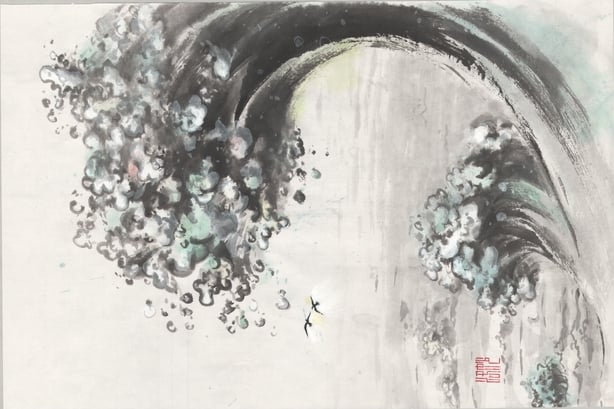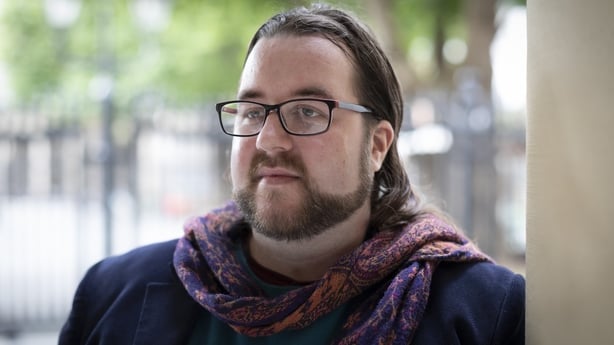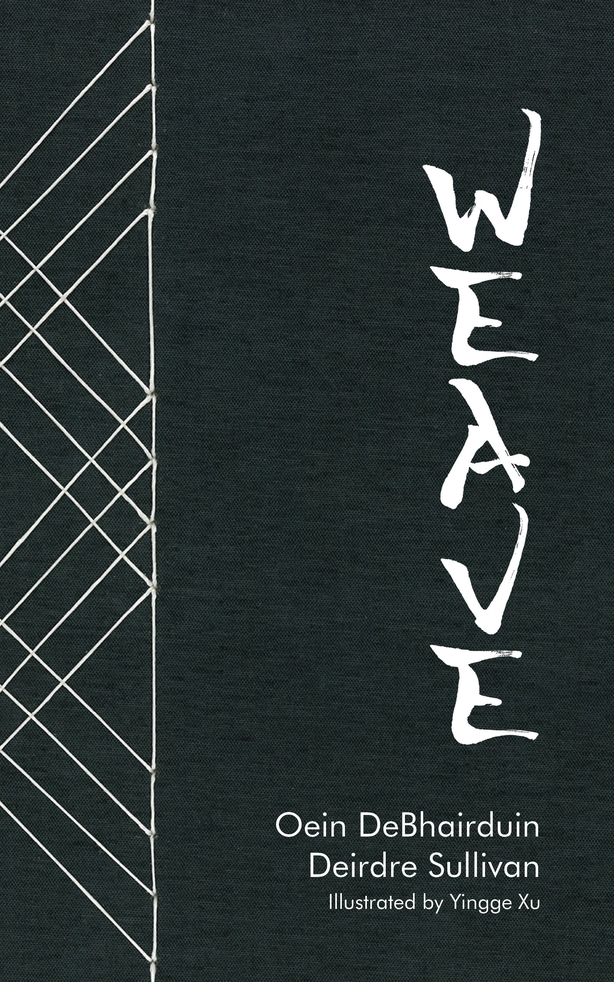We present an extract from Weave, the new collaboration from writers Deirdre Sullivan and Oein DeBhairduin and artist Yingge Xu.
In this unique collaboration, Sullivan, DeBhairduin and Xu explore their shared passion for storytelling, folklore and ritual, via eight stories inspired by the eight festivals in the wheel of the year, intertwining older threads with contemporary spaces.

From Lao Mara by Deirdre Sullivan
The sun is shining and the air is cold. I am playing with my wooden farm. The cow and the sheep and the pig and the horse and the duck are lined up in the field. I move the tractor around the barn, once, twice, three times. I am looking at the farm, but I am listening to Mammy. The sounds she makes, the ones she doesn't know I understand. I cannot make them, even when I try my very hardest. Our throats are different.
I got this farm for Christmas. It came wrapped in a big box, and Dad wanted me to open it first so he could see me love it. He likes it when we smile. Mammy tries to smile when Dad’s here. She isn’t smiling now, though. I try my very best to keep it quiet. She is getting ready to do baking. She has everything all lined up. White flour, brown flour, baking soda, buttermilk and oil. Oil doesn’t mix with water. She showed me in a glass. It floats on top.
I put all of the animals in a shoebox that I painted red. It was black before, so we had to cover it with paper. Mammy’s hands were happier that day.
I watch her work, slapping at the dough over and over. Twisting it like it’s done something bad. Her back is to me and her shoulders are up almost to her ears. She sounds like a dog who wants something. She sounds like the front door Dad has to fix. She cuts a cross into the tops and puts them in the oven. Then she rubs my back and plays with me. She is quieter but her face is sad.
When the loaves are ready, she puts one of them on the windowsill to cool. Once Shep stole a loaf, but Dad beat him for it, so he probably won’t do that again. We will have it later with the dinner, when Dad gets home. He has been gone a while, out on the boats, but he is coming back. He always does. He tells me to be careful around Shep. You never know with dogs, when they will bite. But I love Shep. He has a warm back and a lot of hair. Mammy lets me rub him all the time and that’s a secret, like the second loaf.
The second loaf is warm and the inside of it is all wet and crumbly. Mammy pulls at it with her hands. I reach for some, she bats my hand away. It’s all for her. One by one, she eats the chunks of bread, washed right down with milk. The butter drips down on the tablecloth. I sit and watch. I do not annoy her. When she’s done, she wipes the table with her hand and eats the crumbs and drips, and licks her palm until there’s nothing left. She reaches out a hand to stroke my hair, and then she tells me what she always tells me.
'It isn’t that I’m hungry. I’m just cold.’
I know she is. I feel it too. The same. Mam picks around her fingernails and pulls off a big white strip of skin. I see the red of blood. I get a bandage from the little press and give it to her. She takes it from me, nods and calls me good. I try hard to be good. I want her to stay with us. With me. I reach my arms out wide like Little Nutbrown Hare and I wrap them around her legs. They aren’t cold at all, but on the outside everything is grand. It’s on the inside Mammy feels it hurting. I look up at her and she looks down at me. She’s wearing three cardigans today. Her eyes are shiny dark. The sea at night. And she is strong and soft and beautiful and mine. She smells like home, like warm skin and milk.

From Spideog by Oein DeBhairduin
The sun was slowly setting in the Inagh Valley, in the western lands of the Irish isle, and as the light descended, the shadows stretched and gave a great reach across the lands, claiming them back from the brightness of day to the dimmer fields of night.
An old woman moved through the grounds on her journey home. She was wrapped in a heavy shawl, patterned and patched with echoes of once-vibrant colours, the mossy green of the forest floor, red like flame, and the yellow of a May eve blossom. She was tall and thin-limbed with an age-swept face. Her hair, once ochre, still held streaks of reddish brown in the ashy grey. She moved slowly but with great care, as if not to crush blossom or bush beneath her feet. Her breath was strained and she wheezed with effort and ache. As the sun began to touch the horizon and the light diminished, her progress became even more laboured. Once night had made itself known, the old woman dropped down wearily and rested her head on a bunching of her cloak. She made long, deep, sorrowful wails, stifling them by holding the bundled material to her mouth. Grief was heavy upon her and so deep that it made stale the very air about her. Out of respect, the flowers of the valley, who knew her well, rarely blossomed in her presence. The leaves would resist rustling upon the branches and the birds of the sky neither chirped nor gave swift flutter to their wings when in sight of her. Except for one.
The robin of the valley, though small, was swift and fierce. Her red chest was louder than her voice and announced her inner fire. The warm amber colours of her breast marked both the tenacity of her heart and the bravery of her spirit, maintaining her brightness in even the darkest of places.
The old woman, bound up in her grief, did not at first see the robin when she glided down and took, with nimble feet, a seat beside her. The robin regarded the old woman with a soft tilt of her head, wondering what had befallen her. The bird remained sitting there with the weeping woman, just to be near her. After some time the old woman noticed the robin, and as she gazed upon the little bird, her heart's pain began to unspool itself and out of her mouth poured all of her life, the misery of losing those she loved, the agony she had endured and the malady of living in a world in which she felt so very alone. She spoke of her youth, those days of dreaming when life paths were forged. She told of a great love she had encountered and, with careless thought, had lost. They were to be reunited later in the bright brass days of their lives, but she had once again lost him, this time not to carelessness or dispute, but to a more unbending foe – death.

Weave is published by Skein Press

